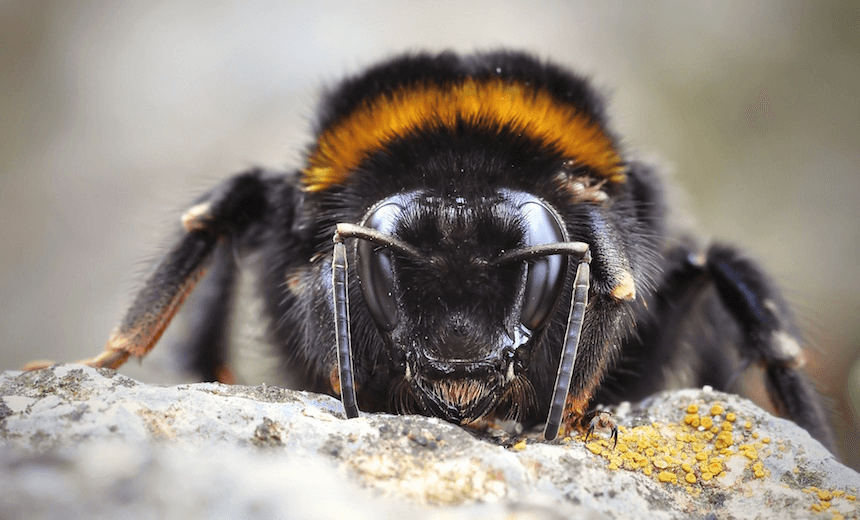The NIMBYs are out in force in Whanganui – though it’s not houses for people the locals are objecting to, but homes for bees. Jess McAllen investigates the apian scandal threatening to engulf the city.
It’s been a tough few years for the bees of Whanganui. Last year 375 hives were stolen, in 2015 their bowel problems were plastered across local media and now nine hives (which contain 30-40,000 bees each) are being shunned by their own city council.
On December 22, last year, when most people were whipping up egg nog or writing letters to Santa, the Whanganui District Council received a complaint about “bee spotting” (the polite word for poo) on a property.
The stuff is tiny, says beekeeper Michael Brandon, “little, yellow or brown, less-than-pinhead-sized spots. They are waxy so solvent or eucalyptus oil is needed to remove it from windows or clothes on washing lines.”
A month ago, the Wanganui Beekeepers Club was served with an abatement notice regarding nine of their hives – although curiously, another hobbyist’s six hives were allowed to stay on. The hives were moved during Easter, before the deadline of Tuesday the 18th of April, to a rural area. The property that hosts the Beekeepers Club is five acres and home to an organic orchard and a heritage trust business.
A spokesperson for the Whanganui District Council says “the notice was served in response to a number of complaints regarding bee excrement on neighbouring properties”.
You can’t really blame the bees though. They don’t know the definition of trespassing, but still, say locals, they sure can shit.
Neil Farrer, from the Wanganui Beekeepers Club, says the group is strongly opposing the ban.
“I really think the council people do not know what they are dealing with,” he says, “they don’t know anything about bees and are not prepared to listen to some older, wiser hats.
“We’re also arguing for the public good of course. People’s fruit trees and gardens all suffer if we take the hives away.”
There could be up to a hundred beehives in the concerned vicinity, says Farrer (the council didn’t agree to his suggestion of putting a drone up in the air and finding them all), and bees will travel up to three kilometres. Members of the club feel they are being singled out because their location is known, unlike some people who keep their hives a secret.
The people who are complaining have very attractive gardens, says Farrer, lots of blue flowers and other sorts that are enticing to bees.
“Now, if they really want to complain about bees they need to plant flowers that are not attractive to bees. They’ll have a nice garden but they won’t be encouraging them to stay there.”
At the heart of the matter – as anyone who has watched Bee Movie will know – comes the fact that bees are an essential part of the ecosystem. Two thirds of our food chain relies on them for pollination, says Farrer, and the fruit trees and gardens in Whanganui benefit from their presence.
But a spokesperson for the Whanganui Council says they have received 41 complaints about urban beehives in the last two years.
The Keeping of Animals, Poultry and Bees Bylaw 2015 is at the heart of this debate. Under the bylaw, bees are excluded from needing to be “contained” or “restrained” – as a chicken might be – however, beekeepers have to ensure their bees do not become a nuisance.
This means that hives should be: shielded by fences or other vegetation no less than 1.8 metres high, placed three metres from a footpath and no closer than ten metres from a neighbouring building.
“This is to avoid bee excrement on washing lines, vehicles and buildings,” according to the council.
But the definition of nuisance “makes a mockery” of what the bees are doing, says Farrer. The term requires offence or injury to health but just how offensive are bee spots, ask the club, and do they outweigh the greater good that bees provide the earth?
Michael Brandon has had to move hives in several areas. “One was via council and another direct from a neighbour of an apiary site. Both had complained of spotting,” he says.
“It’s a hard one. Spots are not nice on feature windows but more and more city dwellers are becoming hobbyist beekeepers so there are more bees around.”
He attributes the newfound popularity of beekeeping to the manuka gold rush – the rising price of manuka honey which has resulted in what police say are organised gangs stealing beehives.
The Council says they are considering “a workshop with representatives from the Wanganui Beekeepers Club, Whanganui District Council and other stakeholders to come up with a workable outcome.”
You may notice that there have been alternate spellings of Whanganui throughout this piece – it’s because the Council and Beekeepers Club also have different views on their namesake town.
The Society section is sponsored by AUT. As a contemporary university we’re focused on providing exceptional learning experiences, developing impactful research and forging strong industry partnerships. Start your university journey with us today.
